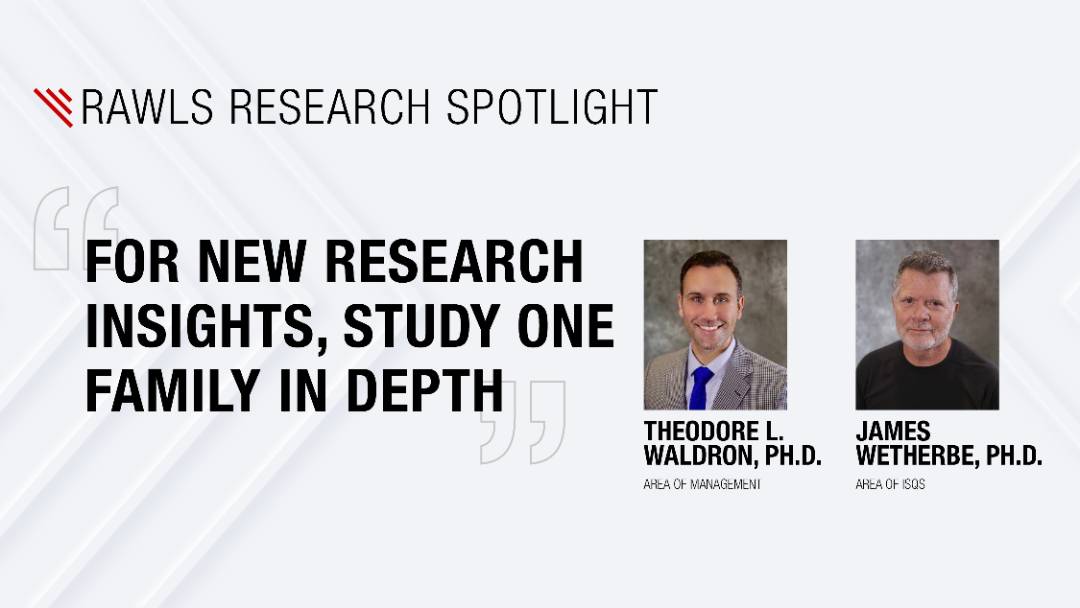
Family businesses make a perfect backdrop for single-case research.
Spotlights
- The authors advocate for single-case research, where a single family business is researched in depth over a long period of time.
- Family businesses are ideal for single-case research because the major players remain constant.
- Businesses can apply single-case research to better understand market trends that impact them (ex: customer preferences or apprehensions).
Quality over quantity is often stressed in business, yet business researchers seem to favor a larger sample size whenever possible. But, what happens when a researcher opts to analyze a single business over the course of many years?
In “For New Research Insights, Study One Family in Depth,” researchers at the Jerry S. Rawls College of Business Theodore L. Waldron, Kent R. Hance Regents Chair in Entrepreneurship, and James Wetherbe, Richard Schulze Distinguished Professor of ISQS, worked alongside Lori Trudell, assistant professor of management at Clemson University, to apply the quality-over-quantity idea to family business research.
The authors advocate for more single-case qualitative studies in family business research, where researchers would focus on one family business and seek to understand their histories, patterns, and decisions in depth over a long period of time.
While following a single business may sound easier than collecting data from multiple businesses, each with their own complex dynamics, this single-case study approach, according to the authors, is underappreciated and misunderstood. The authors note that only about 10% of the published research on family business utilizes this approach.
Even when quantitative scholars attempt to utilize single-case research, they may not know how to properly analyze their data.
“Single-case research requires a different approach, one that is more interpretive,” wrote the authors. “The results of single-case research can't always be widely generalized, and many scholars are uncomfortable with this constraint.”
Because family businesses are family-operated, the authors see those businesses as the perfect backdrop for single-case qualitative research. Researchers can make better connections with the people running a business over longer periods of time because the major players remain constant and there are less variables.
How Businesses Can Apply the Single-Case Approach
According to Waldron, single-case research is useful beyond family business settings.
A growing number of consulting firms and corporations are starting to leverage qualitative methods, such as single-case studies, to understand different market trends like consumer preferences or apprehensions. However, the application of these methods often relies on basic data-gathering strategies, like interviews and focus groups, at one or a few points in time.
The concern here, according to Waldron, is that those one-off settings produce brief windows of insight into complex, unfolding processes.
“It's very much like trying to understand the result of a marathon from one or two photographs taken during the race,” said Waldron.
Waldron offered Meta, previously Facebook, as an example of how businesses could apply a single-case approach to better understand a problem.
“If Meta wanted to better understand the evolution of its reputation for protecting user privacy,” said Waldron, “its in-house researchers might track consumer, employee, executive, company, investor, media, and government perspectives on how well the company protects user privacy and why the hold those views.
Obviously, committing to collecting data over many years presents itself with challenges, not least of which include time and a deep concentration on a single focus.
“Persevering through these challenges is quite worth it,” said Waldron. “Single-case research offers a more accurate and a more complete understanding of how that business comes to achieve the focal outcome.”
Editor's Note
This story discusses research from a chapter in the upcoming book “The Field Guide to Family Business Research,” edited by former Rawls College faculty members Keith Brigham and G. Tyge Payne.
